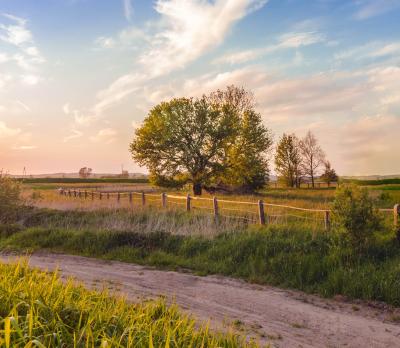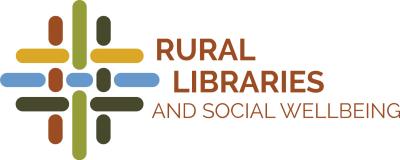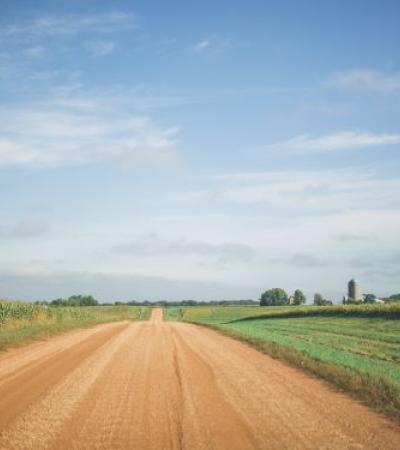In 2019, I became involved with a research project that explored how rural libraries impact their communities. It was a lot of hard work, spanning three years, that eventually revealed itself to be a long love letter to small, rural libraries.
The Rural Libraries and Social Wellbeing project changed my outlook on being a small library director and gave me an outlet when I was close to burning out, and the toolkit we’ve come up with will hopefully help many other libraries connect with their communities, improve upon their current services, and fall in love with tiny librarianship all over again.

Margo Gustina, Hope Decker and Eli Guinee, the researchers behind this IMLS-funded project, knew, as we all do, that small libraries have a positive effect on their communities' wellbeing, but they wanted to prove it. They started by contacting library directors in rural, remote locations across the United States. Narrowing their selections down by town size, distance from schools and large cities, and availability of the director, eight libraries were chosen, including mine in Meservey, Iowa.
Small communities value their libraries
Decker visited my tiny library in August 2019, and she interviewed not only me, but a large handful of patrons, community members and trustees. Each interview included questions like “What does your ideal community look like?” and “How has the library made a difference in your life?” and sought to get feedback on why community members lived in the town and valued the library. Once she had conducted several days’ worth of recorded interviews, the recordings were uploaded to a program that would pick out certain keywords and code each interview.
After these interviews wrapped up in each of the eight communities, things were quiet for a while as the researchers waded through the huge amount of information they had gathered. They discovered several themes reflected in each set of interviews, including being seen and feeling known, belonging and feelings of support, contribution, closeness to nature, and delight. The interviews were largely positive, and most interviewees agreed that they were already living in their ideal communities.
When I read through the interviews from Meservey, I admit that I cried. Like, quite a lot. In this field, it’s so easy to feel unappreciated at times or like the hard work you do every day goes mostly unnoticed by your community. But the quotes from community members about the library really blew me away. It helped me see that what I do is important and has a positive impact on my community, even if it doesn’t feel that way some days.
Tools to assess the importance of your library
Once the data was coded, we got to work meeting weekly and developing a set of tools that could potentially help other libraries like ours. The team came up with some really amazing ideas, like how to create community-building events, see programming potential in your community and patrons, and preserve and appreciate your community’s history. The tools were tested by peer reviewers and revised several times.

My tool focused on staff burnout, which wasn’t necessarily reflected in the community interviews; however, the presence of burnout was definitely clear in the director interviews. For example, I did not think that I was burned out at the time of my interview, but reading through my answers was a rude awakening. Every other sentence was “I know I should be doing this, but…” or “It’s on my to-do list.” I was burnout personified. So I decided to put together an assessment for library staff to take and get an idea of their level of burnout, then read about different ways to avoid it. (Obviously, I am not a doctor, so my tool is just meant to give you a vague idea; please seek out a mental health professional if you are worried about burnout. I did, and it’s the best thing I’ve ever done for myself!) (Also, a quick reminder that what you are doing for your community right now is enough!)
My second tool looked at the symbiotic relationship between the library and the community. Do communities that show a high level of support for one another also support the library just as strongly? Do libraries with lots of community support give back and support their community in other ways? I developed this tool because there were so many beautiful quotes about support in this research. “Everyone would give the shirt off their backs to help everyone, and that’s why I live here,” was my personal favorite. Interviewees discussed community members bringing casseroles in times of tragedy, finishing up a neighbor’s harvest when he was injured, giving rides to the doctor. I just found it so interesting and wondered if that kind of support always translated into support for the library as well.
Here are some other fantastic tools from the project:
- Eli Guinnee's tool on being seen and known: This tool can be used to think about the importance of making each patron feel valued and known and includes tips on improving your personalized services.
- Emilie Davis' tool on nature and getting outside of your library: This tool can be used to reflect on how the library encourages and supports the community's connection with nature and find new opportunities for the library to get outside.
- Jerianne Davis' tool on fostering knowledge and discovery in your library and community: This tool helps you assess both your library and community on your current ability to foster lifelong knowledge and discovery and includes ways to help your community learn and discover new skills and passions.
- Katie Kosior's tool on creating community building events: Includes questions to help you reflect on a community-building event that would work for your community and steps on planning such an event.
Now the project is coming to an end, and it’s bittersweet. I’m going to miss the research team and the work, but it will be exciting to see other libraries using the tools we worked so hard to create. I hope that as time goes on, even more tools, focus groups and conferences will be developed that are specifically aimed at small, rural libraries.
It’s easy to shrug little libraries off; we’re in geographically isolated areas, we have next to no budget, and we’re often miles away from a grocery store, movie theater or even school building — but this research has helped show that little libraries have a big impact on their communities and that being little doesn’t make us “less than."
If you’d like to learn more about this project or check out the toolkit and interviews, please visit rurallibraries.org.
How does your small library have a positive impact on your community? Feel free to reach out with comments or questions; my email is chelseaprice@meservey.lib.ia.us.



